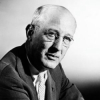Bruce Catton

Bruce Catton
Charles Bruce Cattonwas an American historian and journalist, best known for his books on the American Civil War. Known as a narrative historian, Catton specialized in popular history, featuring colorful characters and historical vignettes, in addition to the basic facts, dates, and analyses. Although his books were well researched and supported by footnotes, they were not generally presented in a rigorous academic style. He won a Pulitzer Prize in 1954 for A Stillness at Appomattox, his study of the final...
NationalityAmerican
ProfessionHistorian
Date of Birth9 October 1899
CityPetoskey, MI
CountryUnited States of America
Say this for big league baseball - it is beyond any question the greatest conversation piece ever invented in America.
I think I was always subconsciously driven by an attempt to restate that faith and to show where it was properly grounded, how it grew out of what a great many young men on both sides felt and believed and were brave enough to do
Early youth is a baffling time
Beneath everything else, North and West, there ran a profound, unvoiced, almost subconscious conviction that the [American] nation was going to go on growing-in size, in power, in everything a man could think of-and in that belief there was a might and a fury that would take form instantly at the moment of shock.
In this respect early youth is exactly like old age; it is a time of waiting for a big trip to an unknown destination. The chief difference is that youth waits for the morning limited and age waits for the night train
Soldiers who had been in the army long enough to know what a bloody swindle war really is would begin to feel that army life was really kind of fun, as long as [General Philip] Sheridan was up front.
The present moment is nice but it does not last. Living in it is like waiting in a junction town for the morning limited; the junction may be interesting but some day you will have to leave it and you do not know where the limited will take you.
Here was the greatest and most moving chapter in American history, a blending of meanness and greatness, an ending and a beginning. It came out of what men were, but it did not go as men had planned.
Our American heritage is greater than any one of us. It can express itself in very homely truths; in the end it can lift up our eyes beyond the glow in the sunset skies.
Nathan Bedford Forrest ... used his horsemen as a modern general would use motorized infantry. He liked horses because he liked fast movement, and his mounted men could get from here to there much faster than any infantry could; but when they reached the field they usually tied their horses to trees and fought on foot, and they were as good as the very best infantry. Not for nothing did Forrest say the essence of strategy was to git thar fust with the most men.
Between 1861 and 1865, Americans made war on each other and killed each other in great numbers - if only to become the kind of country that could no longer conceive of how that was possible.
What began as a bitter dispute over Union and States' Rights, ended as a struggle over the meaning of freedom in America. At Gettysburg in 1863, Abraham Lincoln said perhaps more than he knew. The war was about a new birth of freedom.
The 1860 election became a referendum on the southern way of life.
Shiloh had as many casualties as Waterloo, and yet there were another 20 Waterloos to come.